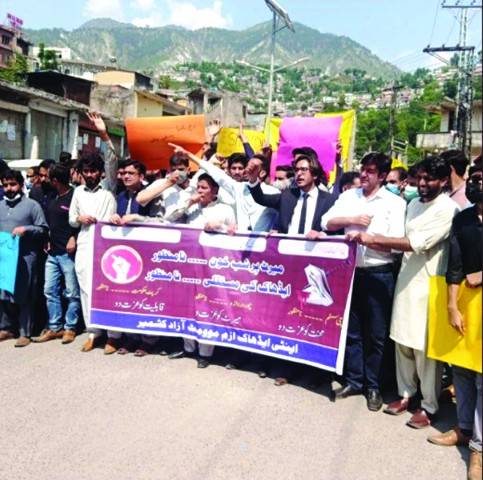
A hashtag SaveMeritInAJK has been trending on social media accounts of Azad Kashmir-based internet users for several days. The sole demand is that the government revoke the controversial law AJK Regulation of the Service of Certain Categories of Contractual, Ad-hoc or Temporary Government Employment (Terms and Conditions) Act, 2021, which was recently enacted by the state legislature.
The ruling PML-N state government, which exploited its strength of majority in the legislative assembly and passed the notorious law, had never thought of facing such an extreme public reaction, particularly from the youth a month prior to the general elections in the state.
While political parties were fielding candidates for the upcoming general elections and their campaigns were scheduled to launch next month, the controversial law ignited strong resentment for the ruling party, particularly Prime Minister Farooq Haider, as the Save Merit in AJK campaign turned into a youth-led mass movement.
The ruling party is justifying its move by claiming that the law was passed on humanitarian grounds to regularize the services of over 4,000 ad-hoc, contract and other temporary employees serving in various public sector institutions for several years.

The civil society, particularly youth, in their angry social media posts and public speeches delivered at several protests in the capital city and other districts said that the exercise not only offended the constitution of the state but had also crushed the aspirations of thousands of promising and resource-less candidates who were confident of their placements in civil service on the basis of competitive exams of the Public Service Commission (PSC).
They alleged that the controversial law was a legal cover for the regularization of over 4,000 people connected to politicians and bureaucrats who were inducted in service without any open competition and were not selected through competitive exams, which itself is against the law.
History tells us that a similar attempt was made by All Jammu and Kashmir Muslim Conference in its tenure in 1992 in which 480 ad-hoc employees were regularized through an identical law, which was labeled as Attique Commission. The law was later challenged and declared ultra-vires of Azad Jammu and Kashmir Interim constitution. The Supreme Court of the state discussed the law in detail in the case titled Tanweer Ashraf vs. Azad Government and Others reported as 2011 SCR 528, where the rule of law laid down in case of AJK Civil Servants (Regularization of Ad-hoc Appointments) Act, 1992 was categorically upheld with full force.
The superior court of the state had questioned how people were being inducted in ad-hoc service by bypassing mandatory procedures under law, using backdoor channels or political affiliations.
At the time, late Sardar Khalid Ibrahim Khan of Jammu and Kashmir Peoples’ Party strongly protested against the approval of the controversial law from the state legislature and resigned from his basic membership from the assembly.
His son, Sardar Hassan Ibrahim, who is presently a member of the legislative assembly took the same bold stance and wrote a very strong dissenting note on the bill.
His dissenting note stated that the constitution and the laws of AJK prescribe a mandatory procedure for appointments of civil servants in service of Azad Jammu and Kashmir which cannot be bypassed by any enactment of assembly under the repeated pronouncements of apex court of the state.
It added that any move regarding regularization of ad-hoc employees will be a pure negation of rights enshrined under Article 4(4)(15) of the Interim Constitution.
A Muzaffarabad-based Twitter user, while criticizing the government’s act, quoted famous the French political philosopher Montesquieu, who once said that there is no greater tyranny than that which is perpetrated under the shield of the law and in the name of justice.
Another social media user in her Tweet pointed out that those who failed to secure passing marks in NTS tests for the posts of junior teachers were later appointed as senior teachers on ad-hoc basis and now being regularized, superseding those who were appointed on merit. She raised genuine questions on the merit and compromises made on the quality of education in the state.
Another civil society activist termed the controversial act “Amnesty Scheme of the AJK government” to accommodate workers, relatives and deep pockets.
During his interaction with journalists at the Dialogue with Capital Journalists Forum, senior minister Chaudhary Tariq Farooq, who is heading the committee constituted to present its recommendations for the regularization of the contract and adhoc employees, said that the bill had been moved under “humanitarian considerations” because many people had been serving as ad-hoc and contractual employees for years.
Lawyers, civil society and youth activists continued to register their protests against the law using all available forums and a number of writ-petitions have been filed in the apex court with hope that the law would be declared as ultra-vires.
The writer is a media researcher and freelance journalist based in AJK. He tweets @SMubasharNaqvi
The ruling PML-N state government, which exploited its strength of majority in the legislative assembly and passed the notorious law, had never thought of facing such an extreme public reaction, particularly from the youth a month prior to the general elections in the state.
While political parties were fielding candidates for the upcoming general elections and their campaigns were scheduled to launch next month, the controversial law ignited strong resentment for the ruling party, particularly Prime Minister Farooq Haider, as the Save Merit in AJK campaign turned into a youth-led mass movement.
The ruling party is justifying its move by claiming that the law was passed on humanitarian grounds to regularize the services of over 4,000 ad-hoc, contract and other temporary employees serving in various public sector institutions for several years.

The civil society, particularly youth, in their angry social media posts and public speeches delivered at several protests in the capital city and other districts said that the exercise not only offended the constitution of the state but had also crushed the aspirations of thousands of promising and resource-less candidates who were confident of their placements in civil service on the basis of competitive exams of the Public Service Commission (PSC).
They alleged that the controversial law was a legal cover for the regularization of over 4,000 people connected to politicians and bureaucrats who were inducted in service without any open competition and were not selected through competitive exams, which itself is against the law.
History tells us that a similar attempt was made by All Jammu and Kashmir Muslim Conference in its tenure in 1992 in which 480 ad-hoc employees were regularized through an identical law, which was labeled as Attique Commission. The law was later challenged and declared ultra-vires of Azad Jammu and Kashmir Interim constitution. The Supreme Court of the state discussed the law in detail in the case titled Tanweer Ashraf vs. Azad Government and Others reported as 2011 SCR 528, where the rule of law laid down in case of AJK Civil Servants (Regularization of Ad-hoc Appointments) Act, 1992 was categorically upheld with full force.
The superior court of the state had questioned how people were being inducted in ad-hoc service by bypassing mandatory procedures under law, using backdoor channels or political affiliations.
At the time, late Sardar Khalid Ibrahim Khan of Jammu and Kashmir Peoples’ Party strongly protested against the approval of the controversial law from the state legislature and resigned from his basic membership from the assembly.
His son, Sardar Hassan Ibrahim, who is presently a member of the legislative assembly took the same bold stance and wrote a very strong dissenting note on the bill.
His dissenting note stated that the constitution and the laws of AJK prescribe a mandatory procedure for appointments of civil servants in service of Azad Jammu and Kashmir which cannot be bypassed by any enactment of assembly under the repeated pronouncements of apex court of the state.
It added that any move regarding regularization of ad-hoc employees will be a pure negation of rights enshrined under Article 4(4)(15) of the Interim Constitution.
A Muzaffarabad-based Twitter user, while criticizing the government’s act, quoted famous the French political philosopher Montesquieu, who once said that there is no greater tyranny than that which is perpetrated under the shield of the law and in the name of justice.
Another social media user in her Tweet pointed out that those who failed to secure passing marks in NTS tests for the posts of junior teachers were later appointed as senior teachers on ad-hoc basis and now being regularized, superseding those who were appointed on merit. She raised genuine questions on the merit and compromises made on the quality of education in the state.
Another civil society activist termed the controversial act “Amnesty Scheme of the AJK government” to accommodate workers, relatives and deep pockets.
During his interaction with journalists at the Dialogue with Capital Journalists Forum, senior minister Chaudhary Tariq Farooq, who is heading the committee constituted to present its recommendations for the regularization of the contract and adhoc employees, said that the bill had been moved under “humanitarian considerations” because many people had been serving as ad-hoc and contractual employees for years.
Lawyers, civil society and youth activists continued to register their protests against the law using all available forums and a number of writ-petitions have been filed in the apex court with hope that the law would be declared as ultra-vires.
The writer is a media researcher and freelance journalist based in AJK. He tweets @SMubasharNaqvi

